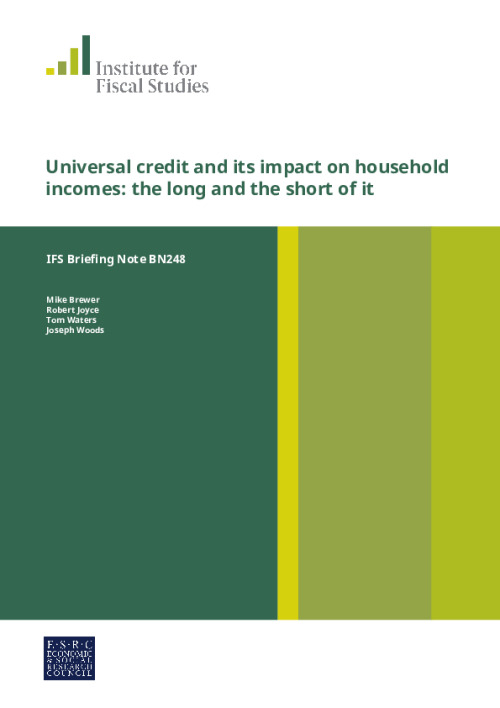In this research we investigate who wins and loses from universal credit, and by how much. For the first time, we also look at the effects of universal credit on people’s incomes over eight years of their lives, rather than just at a point in time. This lets us look at the impact on those that are persistently, rather than temporarily, low income.
Universal credit and the working-age benefits system
The working-age benefits system is undergoing radical reform, with six means-tested benefits and tax credits (the ‘legacy’ system) being replaced by a single payment called universal credit. Under current plans, universal credit is expected to be fully rolled out by mid-2024.
This is a hugely important reform: around one in three working-age households will be receiving universal credit when it is fully rolled out, and it will affect them in a number of ways. The integration of many benefits into one payment is intended to simplify the process of claiming benefits – obviating the need to make more than one claim to different government departments at the same time, or to stop claiming one benefit and start claiming another when circumstances change, and making it easier to be confident of what one is entitled to. It should also address the very weakest work incentives that were present under the legacy system, which arose when people could face the withdrawal of more than one means-tested benefit simultaneously when their earnings rose. But the reform is having many other important impacts on low-income households – with a number of difficulties that were unintended, and some others that are the result of deliberate choices about universal credit’s design – including changes in the regularity of payments, how long people have to wait for them and who within the household actually receives them.
Key findings
Universal Credit disproportionately reduces incomes among poorer adults
Those in the lowest-income 10% of the population on average lose the most from universal credit – a 1.9% fall in their income, equivalent to £150 per year per adult.
Many people win and lose from universal credit – some quite substantially
76% (8.7 million adults) of those entitled to means-tested benefits – and 84% (7.2 million) of those in working households – see a change in their entitlement of at least £100 per annum (p.a.). 17% (1.9 million) see a loss of at least £1,000 p.a., while 14% (1.6 million) see a gain of at least that much.
Changes in entitlements are the natural consequence of integrating together benefits – but four specific government choices account for many of the large losses
77% of those who lose at least £1,000 p.a. are affected by universal credit’s harsher treatment of one of the following groups: those with financial assets; the low-earning self-employed; couples where one member is above state pension age and the other below; and some claimants of disability benefits. The large gains are accounted for partly by universal credit’s more generous treatment of working rented households: 29% of those in such households who are on means-tested benefits see an increase in entitlement of at least £1,000 p.a.
Large losses are often temporary with the effect on incomes over eight years considerably smaller
Those affected by the harsher treatment of the low-earning self-employed on average lose £2,100 p.a. in the year they are affected (the ‘short run’). But when we measure the effect on their average incomes over eight years (the ‘longer run’), they lose on average £850 p.a. – because they often go on to higher-income self-employed work or become employees. Similarly, the average loss from UC’s treatment of assets (among those affected) is £1,430 in the short run, but £420 in the longer run.
Some groups that lose from universal credit are more likely to be on a low income for a short period, so the effect of universal credit on the persistently poor is considerably less than on the temporarily poor
The self-employed, owner-occupiers and people with significant financial assets – all of whom tend to lose out from universal credit – are 1.5 to 2 times as likely as other low-income groups to find that a period of low income is temporary, rather than persistent. Conversely, those who are disabled or who live with a disabled person (who, on average, lose from universal credit) are especially likely to be persistently, rather than temporarily, poor.
Because of these design choices and people’s changing circumstances, large persistent gains or losses are less common than large temporary ones
While 30% of those entitled to means-tested benefits see a £1,000 p.a. change to their incomes in the short run (17% losing, 14% gaining), only 16% see a change that big to their longer-run incomes (11% losing, 5% gaining).
As an overall cut to benefits, universal credit hits the persistently poor harder than those with higher longer-term incomes
Those whose average incomes over eight years are in the lowest tenth of the population – the persistently poorest – lose on average 1.1% of their income over the eight years (equivalent to £100 p.a.) from universal credit, more than any higher-income group.












